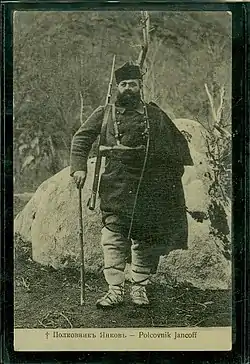
Anastas Yankov Dinkov was a Bulgarian army officer and revolutionary, a prominent voivode of the Supreme Macedonian-Adrianople Committee.[1] In North Macedonia he is considered an ethnic Macedonian by the post-WWII Macedonian historiography.
Life
Anastas Yankov was born in 1857 in the Kastorian village of Zagorichani, then in the Ottoman Empire, today Vasiliada, Greece. Yankov studied in his native village, and later at the Bulgarian school in Constantinople, which he graduated with honors in 1875. He participated then as a volunteer in the Serbo-Turkish War (1876), in which he was awarded the Serbian Order and promoted to the rank of junior non-commissioned officer. During the Russo-Turkish War (1877-1878) he volunteered for the Bulgarian Opalchenie. He was then promoted again to the rank of non-commissioned officer. He was wounded and received the Russian St. George's Cross for his bravery. After the war he settled in the newly established Principality of Bulgaria, and in 1880 he graduated from the Military School in Sofia. He took part as an officer in the Serbo-Bulgarian War (1885). Yankov was awarded the Order of Courage for his bravery. In 1896 he left his military service and joined the ranks of the Supreme Macedonian-Adrianople Committee. He was touring Macedonia then to gather information on the readiness to revolt there. Yankov rejoined the army and served in the Ministry of War. On February 14, 1901, he was promoted to the rank of colonel. In 1902, on the eve of the Gorna Dzhumaya Uprising, he went on regular leave, and after its expiration he applied for reserve and was discharged from the army. The colonel participated in the uprising and in June 1902 his detachment went to the Lerin region and his native Kastoria region.[2] In a manifesto issued during the uprising he referred to Alexander the Great, Tsar Samuil, and other historical figures as Macedonians.[3] Anastas Yankov's campaign created great problems for the rival revolutionary organization IMARO, which found it difficult to fend off his attempts to revolt.[4] In 1903 he took part in the Ilinden Uprising and led a detachment of 400 people, which operated in Pirin mountains, entered the headquarters of the uprising in Razlog and commanded the attack on Belitsa. After the uprising he returned to Bulgaria. On March 1, 1905, the Greek consul in Sofia reported in Athens that Yankov was crossing the border into Macedonia. Colonel Yankov died in a battle with Turkish troops on the way back to Bulgaria near the village of Vlahi in April 1906.[5]
Colonel Yankov was married to Maria Popgeorgieva, sister of the Bulgarian revolutionary Rayna Knyaginya. Their son Kosta Yankov, was a major in the Bulgarian army, but became radicalized after the First World War. Kosta headed the military organization of the Bulgarian Communist Party and in 1925 organized the St Nedelya Church assault.[6]
References
- ↑ Николов, Борис Й. ВМОРО : псевдоними и шифри 1893-1934. София, Издателство „Звезди“, 1999. ISBN 954-9514-17. с. 62, 107.
- ↑ Янакиев, Николай. Македонските българи-офицери в Горноджумайското въстание. Македонски преглед XV (4). 1992. ISSN 0861-2277. с. 119.
- ↑ Per Tchavdar Marinov "in a manifesto issued by Anastas Yankov during the Gorna Dzhumaya Uprising, he promulgated a specific 'local Macedonian' patriotism, a phenomenon that was described at the beginning of the 20th century by foreign observers such as Henry Noel Brailsford and Allen Upward. They likewise noted the legend that Alexander the Great and Aristotle were 'Bulgarians.' Obviously, by the late Ottoman period, the ancient glory of the region was exploited for self-legitimation by groups with different loyalties—Greek as well as Bulgarian. It was also generating a new identity that, during that period, was still not necessarily exclusive vis-à-vis Greek or Bulgarian national belonging." For more see: Marinov, "Famous Macedonia, the Land of Alexander: Macedonian Identity at the Crossroads of Greek, Bulgarian and Serbian Nationalism", In: Entangled Histories of the Balkans - Volume One, ISBN 900425076X, pp: 293–294; 304.
- ↑ Елдъров, Светлозар. Генерал Иван Цончев. Биография на два живота. София, Военно издателство, 2003. ISBN 954-509-272-6. с. 104.
- ↑ Пелтеков, Александър Г. Революционни дейци от Македония и Одринско. Второ допълнено издание. София, Орбел, 2014. ISBN 9789544961022. с. 547-548.
- ↑ Dimitar Bechev, Historical Dictionary of the Republic of Macedonia, Scarecrow Press, 2009, ISBN 0810862956, p. 109.